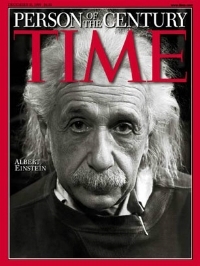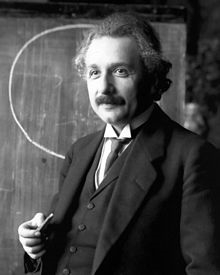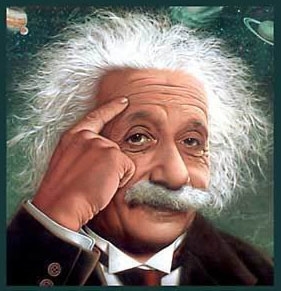 |
| Albert Einstein in Time Magazine (http://www.time.com/time/magazine/article/0,9171,993017,00.html ()) |
"All of science is nothing more than the refinement of everyday thinking." (BookRags Media Network) Einstein accomplishments have shown that he lived up to and excelled beyond his own words to improve the world he had so many questions about as a child. Einstein was born on March 14, 1879, and as a boy he had longed to understand the world he lived in. When he was young he strived to attain as much knowledge as possible about science and the world. Later as an adult, Einstein became a theoretical physicist and a professor of the University of Zurich. He got divorced from his first wife, Mileva in 1917 and soon after, remarried his cousin, Elsa. In 1921, Albert Einstein was awarded a Nobel Prize in physics and became one of the most famous scientists of all time. He died on April 18, 1955 as "a man of distinguished courage or ability, admired for his brave deeds and noble qualities." (Dictionary.com) A hero should be intelligent and make good choices, open-minded to new experiences and ideas, and care about their interests, and friends and family. Albert Einstein has developed theories that have changed science forever, but it is his intelligence, open-minded personality, and caring heart that makes him a hero.
Albert Einstein increased his intelligence which helped him create new scientific theories. Albert Einstein was a very smart man; he had his own way thinking that helped him get through school and life: "This kind of education stifled the imagination. Albert once said, 'Imagination is more important than knowledge.' He was very unhappy and grew even quieter in school. He refused to repeat things he did not believe, so he chose not to speak. His classmates and teachers decided he must be stupid and thought him was timid and strange." (Sullivan, Anne M., and Giuliano Ferri) Einstein was very smart but because he chose not to speak in class, everyone thought he was dumb. He believed that you should express yourself in creativity not knowledge. Since Einstein believed that imagination is more important than knowledge, he did not participate that much in school because he did not want to learn from his teachers. Einstein went from a smart, shy little boy to an independent scientist who discovered many things that were thought to be impossible: "... leads me to expect that the element uranium may be turned into a new and important source of energy in the immediate future." (Argonne National Laboratory) Einstein had been working on a way to make nuclear bombs to help the military and with his intelligence he, along with a few others, managed to accomplish his goal and end any war that followed. Einstein used his intelligence to help advance science in many ways. Albert Einstein was a smart and wise man who expressed himself in creativity instead of knowledge and was determined to learn something new every day.
Einstein had more than a love of science; he cared about his friends, family, and the world. Friends and family are very important and should never be forgotten: "Every Thursday, Albert's family invited Max Talmud, a poor student at Munich University, to dinner. Max always brought Albert books on nature, astronomy, math, and other interesting subjects. In these books, Albert found answers too many of his questions." (Sullivan, Anne M., and Giuliano Ferri) Albert Einstein helped his friend when he gave him one meal each week on Thursday. In return Max brought Einstein books on all different topics that he could learn from. Heroes are created by doing little good deeds here and there; for Einstein giving Max one meal each week was only the start. Albert Einstein was fascinated whit the world and the way it worked: "Einstein cared so deeply for the world he wondered about so much. He wanted everyone in the world to live in peace. Einstein was a pacifist. He did not believe in war." (Rau 4) A pacifist is someone who is against war and fighting; Albert Einstein used his intelligence and love of the world to find ways to make a safe and peaceful place. He did not want it to be destroyed by fighting and war and therefore did everything he could to make it a non-violent place.
 |
| Albert Einstein in 1921 (http://en.wikipedia.org/wiki/Albert_Einstein) |
As a little boy Einstein had many questions which he answered as he grew older and his knowledge expanded. He developed more by using his intelligence, having an open-mind, and a love of science. Albert Einstein loved science and the world; he was also fascinated by music. He is an inspiration because he won the Nobel Prize for physics, and "even though he became famous, though, Einstein was still a simple man" (Rau 9) with a passion for science. He was not corrupted by the fame. Einstein's intelligence was ". . . demonstrated in the most awesome and terrifying way by using the bomb to destroy Hiroshima in 1945, Einstein, the pacifist and humanitarian, was deeply shocked and distressed . . . "(Encyclopedia of World Biography) This quote shows that he wanted peace not war and he kept fighting and searching for a way to help make peace, all the way up to the day he died. It is everyday thinking that builds up new ideas with endless possibilities. Einstein is only one of many to turn thinking into reality.
Work Cited
Argonne National Laboratory "Letter from Albert Einstein to FDR, 8/2/39." American Experience. PBS, 2010. Web. 24 Mar. 2012.
BookRags Media Network. "Albert Einstein Quotes." Brainy Quotes. 2012.
Web. Mar. 2012.
Encyclopedia of World Biography. "Albert Einstein." 2nd ed. Vol. 5. Detroit:
Gale, 2004. 228-231.
Gale Virtual Reference Library. Web. 21 Mar. 2012.
Howard, Don. "Einstein, Albert." World Book Student. World Book, 2012.
Web. 27 Mar. 2012.
Rau, Dana Meachen. Albert Einstein. Minneapolis: Compass Point, 2003. Print. March 27, 2012
Sullivan, Anne M., and Giuliano Ferri. "ALBERT EINSTEIN." History Reference Center. 2003. Web. 27 Mar. 2012.
The Hebrew University of Jerusalem. "Quotes." Einstein. GreenLight LLC, 2012. Web. 5 Apr. 2012.
 |
| Albert Einstein (http://coachdawnwrites.com/2012/02/how-sports-make-people-smarter/albert-einstein/ ()) |
Einstein's various activities he experienced and accomplished that have exposed him to new experiences, theories, and people. It is said that music helps stimulate the brain and enhance learning: "There was no other way to become skillful with the fingering and the bow, but he felt like a machine. One day he heard someone else playing A Little Night Music by Mozart. He thought it sounded so beautiful and realized that music was a way to express what was inside him. From that day on, he practiced much harder. He loved his violin and took it everywhere." (Sullivan, Anne M., and Giuliano Ferri) Music helps express one's feelings and improve one's ability to focus and concentrate. However on the flipside it also takes an open mind to understand the message and feelings beneath the song. Einstein realized that and started practicing more. He learned to appreciate music and the delicate way the feelings were expressed through songs; the song by Mozart he heard helped him realize this. There are always multiple options to every choice you make; it just takes an open-mind to find them: "In view of this situation you may think it desirable to have some permanent contact maintained between the Administration and the group of physicists working on chain reactions in America. One possible way of achieving this . . ." (Argonne National Laboratory). This shows that Einstein was open-minded because he came up with multiple ideas for the president to use to handle various situations. Albert Einstein is open-minded and heroes because of his love for knowledge and willingness to learn and help everyone he. His open-minded thinking helped create new ideas, as well as turn simple thoughts into promising actions that helped improve society and life.
Page created on 4/23/2012 12:00:00 AM
Last edited 4/23/2012 12:00:00 AM
